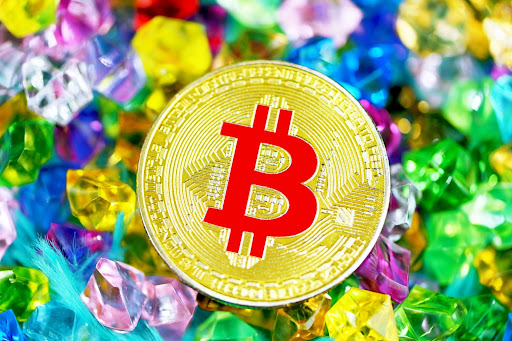Bitcoin.
Like any philosophical debate, you’re sure to get many different answers as to what it really is. Such as…
“It’s digital gold”
Or… “it’s a few thousand virtual piggy banks simultaneously solving sudoku puzzles”,
Maybe even…” it’s God!”.
Bitcoin, at its most basic concept, is an internet currency, with no founder, that is fully transparent, publicly verifiable, with no banks in the middle to create trust, and is secured by cryptography.
For any of you gold bugs out there, Bitcoin’s inflation rate is set in stone by code, not humans. Only 21 million Bitcoins will ever be produced with the last coin being mined in 2140.
This is why some investors consider Bitcoin to be Gold 2.0
Anyone can buy into this network regardless of wealth, social status or credit score. Furthermore, no centralized bank or government can impose its own monetary policy onto it. Bitcoin is the first censorless universal money in the hands of everyday people, not institutions.
Bitcoin was created by an anonymous person (or group) named Satoshi Nakamoto following the 2008 housing crisis.
Back in 2009 when Satoshi announced his creation in an online post, he explained his core problem with traditional financial institutions and fiscal policy,
“The root problem with conventional currency is all the trust that’s required to make it work. The central bank must be trusted not to debase the currency, but the history of fiat currencies is full of breaches of that trust.”
Thus, Bitcoin touts 5 primary benefits:
#1 – It’s Decentralized:
Previous to Bitcoin, nearly all bank ledgers were held in the hands of a few central authorities. If the Federal Reserve, for instance, wanted to add a few more zeros to the balance sheets of these banks it could. Bitcoin changed this by becoming the first full consensus distributed ledger that mankind has ever seen.
To better understand this think of half-apps at Applebees with friends.
If you switched off which friend had to pay each week you’d maybe consider a ledger to keep track of ut all. This is Bitcoin in a nutshell — a ledger that everyone has access to.
There are no actual Bitcoins, just where value is being held or is being sent.
The ledger is validated every 10 minutes by a network of Bitcoin miners, who in this system, act as the bankers. They don’t have to be trusted, unlike the bankers in traditional finance, because Bitcoin miners are incentivized through Bitcoin rewards and game theory to maintain the network’s integrity.
Bitcoin’s motto is ‘don’t trust, validate.’
#2 – It’s Deflationary:
Only 21 million Bitcoins will only be produced.
That means that by 2140, all the Bitcoins ever created will be out on the market making them a deflationary commodity.
Although critics say Bitcoin has no intrinsic value, many in the Austrian school of finance say it’s the soundest money ever created.
At a certain point, no matter how hard you dig for this digital gold you won’t be able to get any more out of it.

#3 – It’s Cryptographic:
Bitcoin uses cryptography — a branch of mathematics that involves techniques for secure communication — to verify transactions.
To be more specific, Bitcoin is protected by an SHA-256 hash function.
This brand of cryptography is so powerful that if we built a supercomputer that uses a Dyson sphere — a hypothetical megastructure built around the sun for energy — and let it run for 100 billion billion years, we’d only have a 25% chance to crack its code.
My inner-nerd loves this stuff.
#4 – It’s Transparent:
Every transaction involving Bitcoin is tracked on a technology called the blockchain. In simple terms, once a transaction is minted onto the blockchain it’s like capturing a fly in amber. Each 1Mb block on the blockchain is unique, permanent, and tamper-proof.
Bitcoin’s blockchain can be traced back to its first-ever transaction by Satoshi Nakamoto in 2009. Although users can access details about these transactions on the blockchain, they cannot access identifying information about the users.
It wasn’t until 2010, however, that Bitcoin established real-world value when someone purchased several Papa Johns’s pizza pies using 10,000 bitcoins — a transaction worth $380 million today.
Institutional investors like Cathie Wood’s ARK own 7.3 million shares of Grayscale Bitcoin Trust, the world’s largest bitcoin fund and the first of its kind. Wood predicts one Bitcoin will one day be valued at $500,000.
#5 It’s Backed By Code:
Arguably Bitcoin’s strongest appeal is that it’s backed by unchanging “laws”. Bitcoin’s inflation rate was set in stone by code. This code is only changeable through a vote where the entire network has to agree to change it (also known as a soft or hard fork).
Besides a few upgrades — such as the Taproot update or Lightning Network — the way Bitcoin’s system runs today is how it’ll run for the next hundred years, or the next thousand years
It’s virtually immutable.
Bottom Line
There is a reason why so many successful investors and personalities like Naval Ravikant, Tim Ferriss, Elon Musk, the Winklevoss Twins, Cathie Wood, and Jack Dorsey are all bullish believers about Bitcoin.
Others believe it’s a matter of time before Bitcoin eats away into gold’s market cap as cryptocurrency is easier to store, transfer, and pay for goods and services.
While there are thousands of cryptocurrencies on CoinMarketCap there are none that act as a better store of value than Bitcoin.
